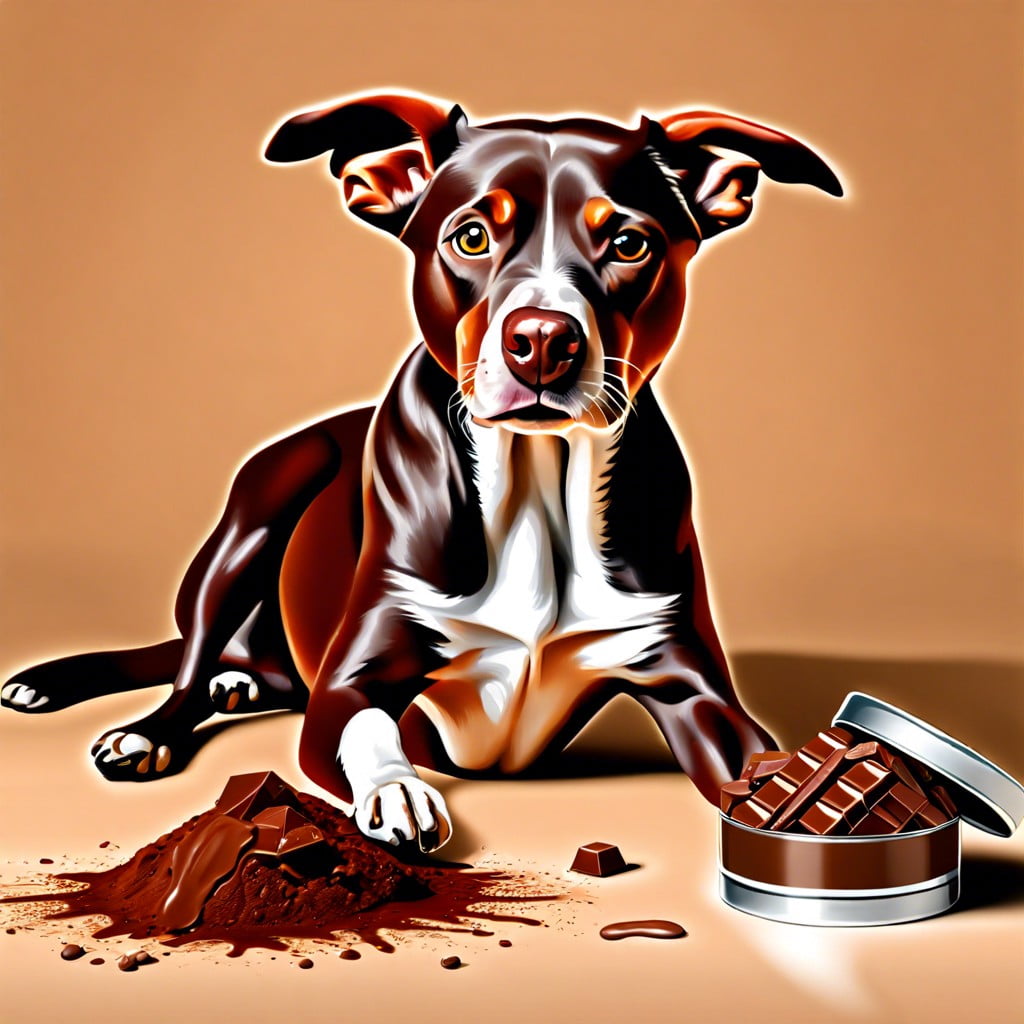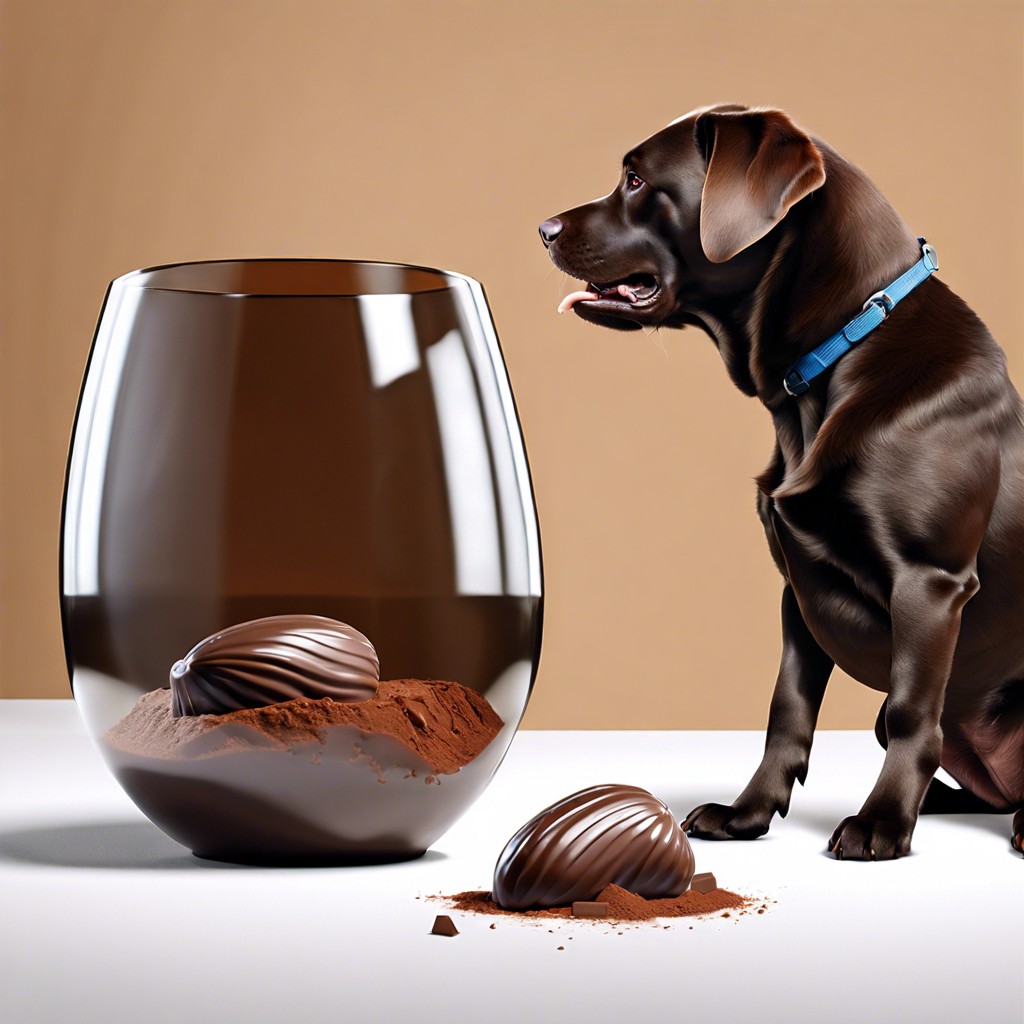Chocolate is toxic to dogs due to the presence of theobromine and caffeine, which can cause a range of health issues from mild discomfort to life-threatening conditions depending on the amount consumed and the size of the dog.
Key takeaways:
- Chocolate is toxic to dogs due to theobromine and caffeine.
- Darker chocolate is more dangerous than milk or white chocolate.
- Symptoms of chocolate poisoning include vomiting, restlessness, seizures, and weakness.
- If your dog eats chocolate, contact a veterinarian immediately.
- Prevent future incidents by storing chocolate securely and educating family members.
Inside
Chocolate Is Toxic to Dogs

Theobromine and caffeine, the main stimulants found in chocolate, are largely harmless to humans but pose a serious health risk to dogs. These substances are part of a class called methylxanthines, and canines have a much lower tolerance for them than humans do.
Even in small amounts, chocolate can cause adverse reactions in dogs. The level of toxicity, however, depends on the type of chocolate, the amount ingested, and the size of the dog. Darker and purer chocolates contain higher levels of theobromine and caffeine, making them more dangerous than milk chocolate or white chocolate.
Within the body of a dog, theobromine metabolizes much more slowly than it does in humans. This slow process increases the risk of toxic buildup, potentially leading to a range of medical complications including vomiting, diarrhea, rapid heart rate, seizures, and in severe cases, death.
It’s essential to be aware of your surroundings and to safely store chocolate out of your dog’s reach. Familiarity with your dog’s weight and the types of chocolate they may encounter can help assess the risk and necessary precautions to keep them safe.
Signs of Chocolate Poisoning in Dogs
Early detection of chocolate poisoning enhances the chances of recovery for a dog. The severity of symptoms can range depending on the amount and type of chocolate consumed. Common indicators include:
– Vomiting and diarrhea: These are often the first signs and may occur within a few hours of ingestion.
– Increased thirst: Dogs may exhibit an unusual need for water due to chocolate’s diuretic effects.
– Restlessness: Affected dogs may appear more hyperactive or agitated than usual.
– Rapid breathing: This can be a sign of elevated heart rate and is a cause for concern.
– Muscle tremors and seizures: These are serious symptoms that can occur with significant poisoning and warrant immediate veterinary attention.
– Weakness or collapse: This indicates a severe reaction, especially if accompanied by cardiac symptoms.
If you observe any of these signs, it’s crucial to act swiftly and consult a veterinarian. Early treatment can be pivotal in managing chocolate poisoning in dogs.
What to Do If Your Dog Eats Chocolate
Act immediately by assessing the situation. Take note of the type of chocolate and the quantity consumed. This information will be crucial for veterinarians.
Contact your veterinarian or an emergency vet clinic without delay. They’ll offer guidance on whether to induce vomiting or come in for treatment.
Keep the packaging. It contains information about the chocolate’s contents and strength which can aid the vet in treatment.
Do not use home remedies or over-the-counter medications without professional advice, as they may be unsafe.
Stay calm and keep your dog in a safe, quiet space to prevent further stress as you prepare for the next steps.
Preventing Future Incidents
Safeguard your chocolates by storing them in secure cabinets or drawers, well out of your dog’s reach. Consider child-proof locks for lower cabinets where chocolate may be accessible to a curious canine.
Educate all family members, especially children, about the dangers of chocolate to dogs. Ensure they understand the importance of not sharing chocolate with your pet, no matter how pleadingly those puppy eyes gaze.
During holidays like Easter or Halloween, when chocolate is more prevalent in the home, be extra vigilant. Keep all candies and chocolates in high places and explain to children why their furry friend can’t partake in the chocolate treats.
If you’re baking with chocolate, keep your dog out of the kitchen until you’ve cleaned up any spills or crumbs that might tempt a quick lick or nibble.
Consider dog-proofing trash cans. A secure lid or a trash can stored under the sink can prevent your dog from scavenging for chocolate wrappers or remains.
When buying dog treats, opt for chocolate-free options. There are numerous safe, dog-friendly alternatives that your canine companion can enjoy without the risk of poisoning.
Emergency Contacts and Resources
If your dog has consumed chocolate, immediate action is critical. Keep a list of essential contacts, such as your veterinarian, the nearest 24-hour emergency veterinary clinic, and the ASPCA Animal Poison Control Center (APCC), which can be reached at (888) 426-4435. The APCC provides a valuable resource with a comprehensive database of toxic substances and is staffed by veterinary health professionals who can give advice on poisoning incidents.
The Pet Poison Helpline is another resource available to pet owners for a fee. Contact them at (855) 764-7661 for assistance with potential poisonings.
In case of an emergency, having your pet’s medical records accessible can provide essential information for prompt and effective treatment. This includes your dog’s weight, any pre-existing health conditions, and detailed information about the chocolate ingested, such as the type and estimated amount.
It’s also beneficial to have on hand a pet first aid kit that includes items useful in case of toxin ingestion. While most treatments will need to be performed by a professional, having tools like activated charcoal—which may be recommended by a vet to administer at home—can be vital in the time it takes to get your dog to a professional.
Remember, despite these resources, consulting with a veterinarian immediately is non-negotiable; they will provide the most appropriate and safe instructions for your specific situation.




